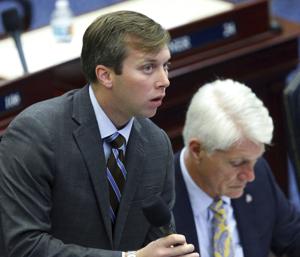Committees get first look at Florida budget projections, 2021 session bills

(The Center Square) – With preliminary legislative committee meetings underway in Tallahassee, it’s clear a theme of the 2021 legislative session will be finding money to plug pandemic-induced budget holes.
The House Appropriations and Ways & Means committees and the House Infrastructure & Tourism Appropriations Subcommittee got first looks this week at Florida’s projected $3.3 billion two-year revenue shortfall, including an estimated $2.75 billion deficit in fiscal year 2022, which begins July 1.
House Appropriations Committee Chairperson Jay Trumbull, R-Panama City, said Medicare caseloads, which have increased from 3.9 million to 4.4 million, could foster a $1.2 billion increase in state funding and force corresponding cuts.
“It is mathematically impossible to cut $2 billion out of this budget without taking anything from education,” Trumbull said.
House Infrastructure & Tourism Appropriations Subcommittee Chairperson Jayer Williamson, R-Pace, said among “alternative ways” to plug budget holes would be to give lawmakers more discretion in managing trust funds, noting “99 percent” of the budget is derived from state and federal trust funds.
Several notable bills have been filed ahead of the legislative session, in addition to the controversial Combating Public Disorder Act. They include:
• Pain-Capable Unborn Child Protection Act: A year after the Florida Legislature adopted a law that requires parental consent for minors seeking abortions, newly elected Rep. David Borrero, R-Miami, will introduce the Florida Pain-Capable Unborn Child Protection Act to prohibit abortions beyond five months of pregnancy.
Borrero’s bill, not yet filed, is similar to the proposed federal Pain-Capable Unborn Child Protection Act, or Micah’s Law, passed by the House in 2013, 2015 and 2017 before it stalled in the Senate.
State versions of the bill have been adopted by 19 state legislatures. Two such bans – Arizona and Idaho – have been stymied by court rulings.
• COVID-19 liability: Florida Chief Financial Officer Jimmy Patronis, Florida Justice Reform Institute, American Property Casualty Insurance Association and Florida TaxWatch are applauding the House Civil Justice & Property Rights Subcommittee’s endorsement of House Bill 7, which would extend COVID-19 liability protections to businesses, schools, nonprofits and religious institutions that make a “good-faith effort” to follow guidelines.
Filed by Rep. Lawrence McClure, R-Dover, HB 7 and Senate companion Senate Bill 72, filed by Sen. Jeff Brandes, R-St. Petersburg, propose immunity from coronavirus-related lawsuits for businesses but exclude health care providers. Legislation addressing the medical industry is expected to be filed.
Citing a newly released analysis, Florida TaxWatch President and CEO Dominic Calabro said “if employers’ confidence in the economy is shaken due to the absence of a liability shield,” Florida could lose 356,000 jobs and $27.6 billion in annual economic activity.
• Unemployment system: Sen. Bobby Powell, D-West Palm Beach, has introduced one of three Senate bills seeking to “modernize and revamp” Florida’s unemployment system, which collapsed in March and drew national scrutiny for its meager $275-a-week benefit and national-low 12 weeks of eligibility.
Powell’s Senate Bill 592 has gained a House companion, House Bill 207, filed by Rep. Anna Eskamani, D-Orlando. Both seek to expand benefits to a weekly maximum of $500 for up to 26 weeks while enhancing oversight.
• Parents’ Bill of Rights: Rep. Erin Grall, R-Vero Beach, has reintroduced her Parents’ Bill of Rights, which passed along party lines in the House last year before dying in the Senate. Sen. Ray Rodrigues, R-Fort Myers, is expected to file a Senate companion.
As with its 2020 version, Grall’s House Bill 241 would prohibit governments and school districts from limiting a parent’s right to direct the moral and religious upbringing, education, health care and mental health of his or her child.
The bill stipulates parents have a right to all “important information relating to a minor child, including all school or governmental records of the child, and requires parental consent before taking the child’s blood or DNA.”
Disclaimer: This content is distributed by The Center Square

